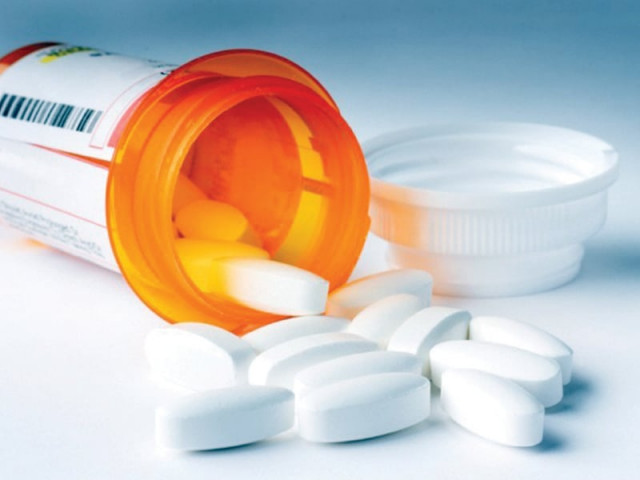Dispute drags on: Deadlock over prices leads to shortage of drugs
Supply of vaccines have particularly been affected as imports become expensive.

Drug makers say depreciation of the rupee and higher costs have made it impossible for them to make or market some of the products. PHOTO: FILE
Like any parent Alam Azhar, a banker, wants the best for his children. So in May this year, he took his two-year-old son to Karachi’s biggest hospital for routine immunisation course against typhoid. He was turned back. The vaccine wasn’t available.
“It has been four months and they still don’t have the vaccine,” he said. “The staff says that the companies have stopped supply. They have a vaccine of some little-known company but doctor said he wouldn’t advise using it. Now I am waiting like all others.”
Retailed at Rs400 a dose, Typherix and Typhim are the only trusted typhoid vaccines, which are marketed by two multinational firms. Both of them are “short” in the market.
A lingering tussle between successive governments and medicine manufacturers over price regulation has led to a shortage of some essential medicines this year.
Supply of vaccines has particularly been affected as none of them are made locally. Import has become extraordinarily expensive at current retail prices with a steep depreciation of the rupee.
“Vaccines are delicate. They have to be supplied at right temperature. No doctor would take the risk of administering anything other than established brand names,” said an industry official.
Medicines used in treatment of illnesses ranging from migraine to cancer have slowly disappeared from pharmacies as the government continues with a 12-year moratorium on price increase.
“Even Panadol CF is difficult to find now. The shortage has created a black market for the products,” said Abdus Samad, a wholesaler. “This situation is going to get worse in winters when we need to treat cold, fever and sinus.”
The government has dillydallied on agreeing to any across-the-board rise in prices like it used to give prior to 2001. Officials say expensive medicines will lead to political backlash.
“When it comes to medicine prices, we face a lot of criticism,” said Health Secretary Imtiaz Inayat Elahi. “But we have decided to give an interim price hike while we work on a pricing policy. This will be a minimum increase.”
The Drug Regulatory Authority of Pakistan (DRAP) was created last year after lengthy deliberations between the government and industry officials. Besides monitoring the industry, DRAP is also responsible for fixing prices, which has never happened.
But the mistrust between the bureaucracy and industry is evident. “The shortage has been deliberately created to corner us. We have to think about national interest. Many of the medicines are used by poor,” said a senior ministry official.
On the other hand, industry says there are unnecessary delays in determining a fair price even when products are reviewed on case-to-case basis. Government officials, they say, are not qualified to carry out drug costing.
“It’s all about feasibility. The private sector has to make money,” said Haroon Qassim, managing director of PharmEvo. “The price has to meet the cost plus giving a fair profit.”
Even though Pakistani pharmaceutical industry doesn’t make new molecules, local companies say they must be rewarded for novelty that goes into making generics.
The deadlock over the price issue has stopped companies from introducing new products as well. PharmEvo worked on a high potency version of its diabetic tablet. “But the price they were giving us wouldn’t even meet our expense. We didn’t introduce the drug after that.”
The size of the Pakistani drug market is estimated at $2 billion in terms of sales – big enough to attract investment. On the contrary, multinationals like Roche and MSD have wrapped up operations over the years.
Both domestic and multinational drug makers say the depreciation of the rupee and higher costs have made it impossible for them to make or market some of the products.
Nevertheless, at least one bottleneck seems to be disappearing. Health Secretary Elahi says new pricing policy will look to “reduce interaction between government officers” and industry people when it comes to deciding the price.
He didn’t elaborate, but the industry has been complaining about harassment as government officials seek unnecessary details about product costing, a process which is often corrupt.
Pharma Bureau, which represents multinational firms, did not give reasons behind the shortage of medicines but complained about increase in production cost.
“Inflation, wages and prices of all inputs have gone up. But medicine prices haven’t been increased,” said Ayesha Tammy Haq, executive director of the Bureau. “To sustain, companies have been cutting cost on packaging and removing plastic spoons, which used to come with syrups.”
Already many discussions have been held on the subject, she said. “Frankly speaking, we have no hope.”
Published in The Express Tribune, October 16th, 2013.
Like Business on Facebook, follow @TribuneBiz on Twitter to stay informed and join in the conversation.


















COMMENTS
Comments are moderated and generally will be posted if they are on-topic and not abusive.
For more information, please see our Comments FAQ